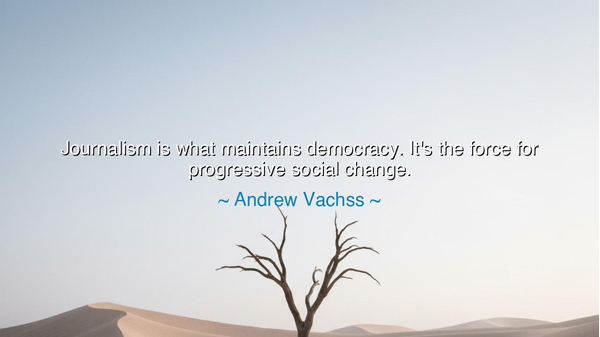
Journalism is what maintains democracy. It's the force for






Host: The rain had been falling since dawn, steady and cold, painting the city in gray. The newsroom was nearly empty now — only the hum of computers, the buzz of a flickering fluorescent light, and the echo of typing that broke the silence like a heartbeat.
Stacks of newspapers, half-empty coffee cups, and the smell of ink and tension filled the air. Outside the window, the streets shimmered with reflections — sirens, billboards, and the hollow glow of a city that had forgotten how to sleep.
Jack sat at his desk, his fingers stained with ink, his eyes narrowed at a screen full of redlines and headlines. Jeeny stood by the window, her arms crossed, watching the rain, her silhouette a still contrast to the chaos around her.
A quote was pinned to the wall, faded but visible, the letters bold and unapologetic:
“Journalism is what maintains democracy. It’s the force for progressive social change.” — Andrew Vachss
Jeeny: “You used to believe that, didn’t you?”
Jack: “Used to.”
Host: His voice was low, hoarse, tired — the sound of a man who’d fought too many wars with words and lost too much faith in truth.
Jeeny: “So what changed?”
Jack: “The world. Or maybe I just saw it too clearly. Journalism isn’t a force for change anymore, Jeeny — it’s a mirror for chaos. We don’t shape the truth; we sell it.”
Jeeny: “You sound like one of those cynics who forgot why they picked up a pen in the first place.”
Jack: “I picked it up to fight. To expose. To believe that truth could shake power. But now? Truth doesn’t sell. Drama does. Fear does. Clickbait is the new constitution.”
Host: The rain beat harder on the glass, as if the sky itself were listening — crying, perhaps, for the death of idealism.
Jeeny: “That’s not the whole truth, Jack. There are still journalists risking their lives to report what matters. Maria Ressa, Daphne Caruana Galizia, the reporters in Ukraine, in Gaza, in Myanmar — they’re not selling drama, they’re buying it with their blood.”
Jack: “And for what? The world scrolls past their sacrifice like it’s yesterday’s weather. The truth is too inconvenient for most people. They want confirmation, not information.”
Jeeny: “Then that’s why journalism has to exist — to disturb that comfort. To remind people that freedom isn’t a feeling, it’s a fight.”
Jack: “A fight against who, Jeeny? The governments? The corporations? Or the audience that no longer cares?”
Host: Her eyes flashed, a fire burning beneath her softness.
Jeeny: “Against apathy, Jack. That’s the enemy now. The world isn’t dying because of lies — it’s dying because too many people have stopped listening.”
Jack: “You think a few articles can wake them? That a headline can heal a generation addicted to noise?”
Jeeny: “It’s not about healing, it’s about resistance. Every truth printed is a rebellion against forgetting. When Watergate broke, it wasn’t politics that changed — it was courage. When Emmett Till’s story was told, it sparked a movement. Words can still ignite if someone’s willing to strike the match.”
Host: Jack stood, pacing, his boots leaving muddy prints on the floor — marks of conflict, motion, disbelief.
Jack: “Those were different times. Back then, truth was a weapon. Now, it’s noise. Everyone’s a journalist, everyone’s an expert. The internet turned the press into a circus, and we into the clowns.”
Jeeny: “And yet, even in a circus, someone has to speak the truth about the tent being on fire.”
Host: The room fell still. The rain softened, tapping gently now, like the pulse of a thought forming in the dark.
Jack: “You really believe the pen still matters?”
Jeeny: “I do. Because it’s the only thing that’s ever mattered. Empires collapse, kings die, armies fall — but a story, told honestly, outlives them all.”
Host: Jack stopped, his reflection in the window blurred by the rain, split by the light of the streetlamps — a man caught between idealism and exhaustion.
Jack: “Then tell me this — if journalism is what maintains democracy, why does it feel like democracy is drowning?”
Jeeny: “Because truth is work, Jack. And democracy is the result, not the guarantee. It only lives if we keep feeding it — with facts, with courage, with questions. The moment we stop, the darkness returns.”
Jack: “And what if people don’t want the light?”
Jeeny: “Then we hold it for them. That’s what journalists do. We bleed so others can see.”
Host: A silence fell between them — the kind that hurt, not because of anger, but because of understanding. Jack’s eyes softened, the steel of his doubt cracking just a little.
Jack: “You really believe in this, don’t you? In the power of a story.”
Jeeny: “It’s not belief, Jack. It’s duty. If truth dies, freedom follows. That’s the deal every society makes with its storytellers.”
Host: Jack walked to his desk, his hand resting on the keyboard. The screen glowed, the cursor blinking — a heartbeat, waiting for its voice.
He sat, stared, then typed. Slowly. Deliberately. The click of keys cutting through the silence like the first drops of rain before a storm.
Jeeny: “What are you writing?”
Jack: “Something true.”
Jeeny: “That’s all it ever takes.”
Host: The camera of the moment pulled back — the rain tapering off, the lights of the city flickering, the newsroom alive again, if only faintly.
And in that quiet, as the keys kept moving, truth breathed again — fragile, defiant, but alive.
Because democracy, like journalism, does not survive on certainty, but on the bravery to keep asking, even when the answers hurt.






AAdministratorAdministrator
Welcome, honored guests. Please leave a comment, we will respond soon